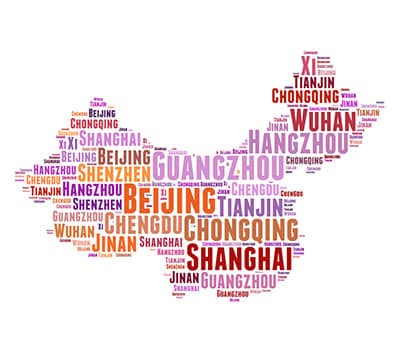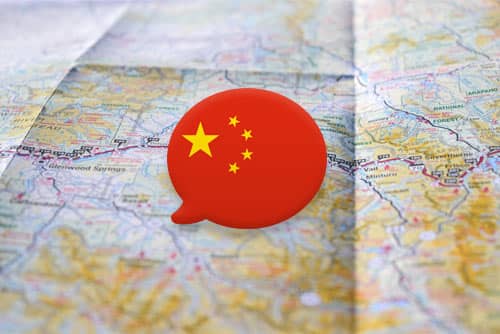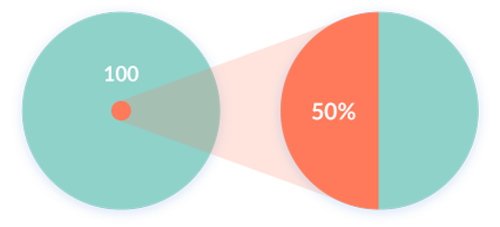Common Chinese Words: Facts and Figures
The Chinese language is one of the most ancient languages in the world and its beauty lies in its words.
The Chinese language is estimated to be made out of a total of 500000 words with the largest Chinese dictionary having over 370000 words. This can seem a really big and frightening number to someone wanting to start learning Chinese, but here's the good news: you only need to know roughly 5% of the total words to be fluent in Chinese. This means that focusing your efforts on learning the most common Chinese words you will be fluent in Chinese in no time.
What’s even more encouraging is that knowing as little as 100 words helps you understand half of the words in an article or book written in Chinese. Learn the most common 1000 words and you get to a 75% understanding of texts in Chinese. Also, each new word you learn helps you guess the meaning of up to 185 words you have never seen before. This means that knowing only 1000 words helps you guess up to 185000 Chinese words. Doesn't seem that frightening now, right?
Top 10 cool and common Chinese words pronounced by native Chinese speakers
1. 你好 = Hello.
Let's naturally start with "你好" which means "Hello" in Chinese. This is one of the most known words in Chinese and a great way to start a conversation with someone from China.
2. 爱 = Love
Love is a universal feeling and we definitely had to talk about it here. Chinese people have a lovely way of saying they love someone or something through the word "爱".
3. 幸福 = Happiness
When there's love, there's definitely happiness. We are all chasing "幸福" as Chinese speaking people would say.
4. 猫 = Cat
Let's talk pets. There are two types of people in the world: cat people and dog people. We are going to talk about cats first or how people in Hong Kong would say: "猫".
5. 狗 = Dog
But let's not forget our lovely and loyal companions, dogs. A dog in Chinese is "狗", a really useful word for dog lovers worldwide.
6. 微笑 = Smile
Now it is time to smile or how someone from China would say "微笑". Smiling makes us happy and helps us stay healthy, so that's why we all need to smile everyday.
7. 中国人 = Chinese
Next, let’s see how people in China call Chinese people. The correct answer is "中国人".
8. 是的 = Yes.
Yes, we have arrived at number 8 where “yes” is the subject to be discussed. Chinese speakers say “yes” by simply saying "是".
9. 谢谢你 = Thank you.
Thank you for reading this far or should I say "谢谢你" as they say in Chinese.
10. 再见 = Good-bye.
No polite conversation can end without a good old goodbye or "再见" how Chinese people usually say.
Chinese words spoken by native speakers
It’s been proven that you learn any language faster when you hear natives speak. That’s why our linguists have made listening to natives an essential part of the learning experience. All phrases within the app are recorded by professional Chinese speakers so you can sit back and absorb the correct pronunciation of the most common Chinese words effortlessly.
Now, let’s explore the ultimate goal of learning Chinese: having real conversations. That’s exactly why we’ve made speaking exercises an essential part of our lessons so you can practice the cool Chinese words you just learned. You have to try our Voice Chatbot, a computer program so advanced you can actually have an intelligent conversation with. Just engage in a conversation and you get asked questions, you respond and the Chatbot understands what you're saying and continues the chat. It’s a remarkable technology that made millions of people fall in love with Mondly.

Did you know?
Learning the Mandarin Chinese characters is probably the most difficult part of learning Chinese. This is mostly because there are a whooping 50000 characters in the Chinese language. The good news is that you only need to know around 2500 characters to be able to read over 95% of texts in Chinese. By knowing only 2000 characters you can read a Chinese magazine. More importantly, learning even your first 10 characters is extremely rewarding. The Chinese characters are visually pleasing, knowing even a few of them makes you feel smart and using them in writing gives you an insight into the Chinese culture and way of life.
What’s the most complicated Mandarin Chinese character? It’s called “Biang”, has 57 strokes and describes a type of Shaanxi noodles. Yes, a lot of work for some noodles. This character is so complex that it cannot be used on a computer. That’s why substitutes like “bàng bàng miàn” (棒棒麵) or “bāng bāng miàn” (梆梆麵) have been created to replace the character and make it easier to write with the help of a keyboard.
The benefits of learning the most common Chinese words first
The benefits of learning the most common Chinese words first
 Make Chinese learning fun and easier
Make Chinese learning fun and easier
Starting with the Chinese basics means you will begin by learning the easiest words first and gradually increase difficulty. This way you will feel great while learning and see how your language knowledge broadens.
 Have basic Chinese conversations in no time
Have basic Chinese conversations in no time
You'll be able to speak to someone from Beijing or Shanghai about regular topics like weather, politics or family. This will make you confident in your Chinese skills and eager to learn more.
 Become fluent in Chinese faster
Become fluent in Chinese faster
By learning the most common Mandarin words first you are learning the smart way. Why learn the most unusual words in Chinese when you might never use them in real life?
 You improve your Chinese vocabulary
You improve your Chinese vocabulary
Each new Chinese word you learn piles up until your vocabulary builds stronger and stronger. Each lesson gets you one step closer to fluency.



No comments:
Post a Comment